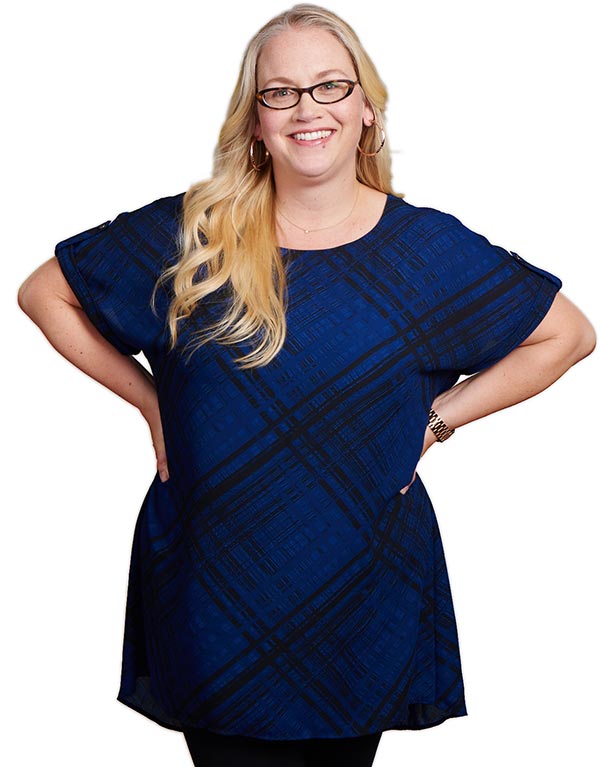You guys know that I’m not anti-celebrity or anti-media. I love watching America’s Next Top Model, and, heck, I’ve worked for women’s magazines for the last nine years. That said, I know this star- and body-obsessed culture of ours is not always a good thing for body image—especially for young women who have eating disordered tendencies. That’s why I’ve asked Michelle Konstantinovsky from About-Face, a non-profit group that aims to educate girls and young women about media messages and realities that may affect their own self-image.
See, Michelle worked as a music journalist for a while, which brought her face-to-face with a lot of celebrities on the red carpet. That taught her a few really interesting lessons about celebrity culture and body image—lessons she’s sharing with us today! xo…Sunny
I began a steady diet of celebrities, gossip, and entertainment straight out of the womb. For as long as I can remember, I’ve always been captivated, mesmerized, and downright obsessed with the glitz and glamour of Hollywood. From sneaking peeks at supermarket tabloids as a kid, to wallpapering my room with Leonardo DiCaprio posters as a Titanic-loving teen, to realizing my ultimate fantasies and landing on celeb-packed red carpets as adult, knowing the ins and outs of the rich and famous has always been my forte.
So what’s the problem with a little guilty pleasure, right? Especially in a world where Perez Hilton is a bored web surfer’s best friend, celebrities play a big role in our everyday lives. But it’s not all harmless entertainment. Particularly when we’re talking about the huge impact the media has on women. I know firsthand how deeply the deceptively glamorous images in movies, magazines, TV and more can affect a female’s sense of self-worth.
Would I have developed disordered eating habits and distorted body image issues had I never picked up an US Weekly or watched an episode of Beverly Hills 90210 (now I’m really aging myself)? Probably. But it certainly didn’t help to constantly compare myself to the pin-thin bodies in the media. I spent years agonizing over my weight, engaging in unhealthy eating and exercise behaviors, all in an effort to emulate the seemingly perfect starlets I saw onscreen and in print.
You’d think that by the time my job brought me face-to-face with the picture-perfect idols I worshipped, any remaining confidence I had would have taken a nosedive. It would have made sense if being near all those gorgeous glamour girls had sent me spiraling into an abyss of everlasting insecurity. But guess what? After a year of interviewing celebrities, standing side by side with them, watching them turn on the charm for every camera on the carpet (and turn it off the second they thought no one was looking), I came away feeling better than ever. Maybe it was maturity, or maybe it was a deep dedication to finally get real and get my health back on track. But maybe it was seeing these seemingly mythical movie stars up close and personal that changed my views. Whatever it was that snapped me into reality, the experience taught me so much that I wish I’d known as an easily influenced, media-crazed kid. I can’t go back in time and spare myself any self-induced suffering, but I can try to spare some of you from unnecessary self-loathing. Here are some of the most important lessons I learned from my days as a red carpet reporter.
1. Celebrities get help to look the way they do. A lot of it.
I’m not talking the kind of help you get from your friends while picking out a new shade of lipgloss. Stars employ an entire entourage of professional primpers, assistants, and specialists to look the way they do. It takes hours of work, layers of makeup, and piles of cash to prep for the cameras. And when a celebrity has a photo shoot, it takes more than hair extensions, false lashes, and million-dollar duds to look picture-perfect. Thanks to the every-evolving world of technology, cellulite can be airbrushed away, freckles are often Photoshopped out, and it’s not uncommon for editors to digitally slap the face from one frame onto a body in another. Creepy, right?
2. At the end of the day, it’s all about the Benjamins.
Most celebrities rely on their looks to sustain an income. Of course, there are a handful of successful actors, musicians and artists who eschew Hollywood’s narrow beauty standards, and capitalize on their pure, unadulterated talent. But the majority of stars feel constant pressure to maintain youthful skin, rock-hard abs, and impossibly shiny hair. Ever rolled out of bed and run to the store, sans makeup? It’s a safe bet you weren’t ambushed by paparazzi hiding behind bushes, only to have your less-than-flattering image plastered across gossip blogs. Celebrities have to keep up with increasingly impossible aesthetic ideals, or face irrelevancy. It’s not all vanity and narcissism motivating them to strive for perfection (though that certainly has something to do with it): in the unfair microcosm of Hollywood, beauty equals money. Period.
3. Stars don’t always prescribe to “healthy diet and exercise.”
No matter how many times you hear of someone famous claiming to have a naturally fast metabolism, an insatiable appetite for wholesome nutrition, or an unwavering commitment to balanced workouts, don’t be so quick to buy into it. It’s undeniable that plenty of celebrities are genetically predisposed to be thin, but many spend hours a day in the gym and consume carefully crafted, calorie-restricted diets (both behaviors that can be seriously hazardous to your health). But beyond disordered eating and exercise habits, there are plenty of nips and tucks happening behind-the-scenes. Stars have access to top plastic surgeons, that often don’t hesitate to perform liposuction, tummy tucks, breast enhancements, and more on desperate celebs. Though it’s certainly a person’s personal decision whether or not to go under the knife, the abundance of cosmetic procedures in Hollywood only feeds the public’s false impression of stars’ superhuman perfection. And let’s not forget the slew of celebrities who have used and abused drugs, some of whom may have embarked on deadly addictions in hopes of keeping the weight off.
4. You want to be remembered for more than being a skinny celeb-wannabe.
It sounds cheesy, but it’s true. We all have way more to offer than protruding bones and frail frames. Constantly striving to emulate the contrived images we see isn’t just destructive to ourselves, it deprives the world of what we really have to offer. It wasn’t until I stepped off the red carpet and into my role at About-Face that I realized how much I cared about using my passion for writing to educate girls and women about media realities. It doesn’t have to take a decade of disordered eating or a year of exposure to Hollwood’s dark side to realize what makes life worth living. Take some time to explore who you are, not who others are telling you to be. And maybe consider canceling that US Weekly subscription.
Hey it’s Sunny again. I actually do have a subscription to US Weekly (smiles sheepishly)—but I also have a very well-established sense of myself. Not only that, but I know how the proverbial sausage is made: I know what goes into getting celebs ready for photo shoots because I’ve been on a few, I know how hard many of them have to work to maintain the body shapes producers, directors, and, yes, viewers, demand of them, because I’ve interviewed their trainers and dietitians, I know just how much photoshopping really does go into a finished magazine cover, because I’ve seen them marked up by art directors. And that’s why I support the kind of work that Michelle and About-Face are doing: I’m not interested in legislating what media consume, but education is the key.
What about you? Do you feel like media images of celebrities have ever negatively affected your self esteem or body image? Why or why not? xo…Sunny




![How Therapy Has Worked For Me [guest post]](../../../../wp-content/uploads/2011/02/therapy_thumb.jpg)

![Have You Dared to Tell People About Your Eating Issues? [guest post]](../../../../wp-content/uploads/2011/05/3674715600_57a4e914e43-253x300.jpg)
![How to Deal With Big, Bad Food Guilt [guest post]](../../../../wp-content/uploads/2011/04/2551148803_0f4b7486be-300x242.jpg)


We know from research that the media absolutely has an impact on both women’s and men’s self-esteem, mood, and body image. I believe it’s not about shutting out all media from our lives (because we really can’t remove ourselves from all media), it’s about becoming educated about the realities from articles like this one. For me, I’ve learned to question the media that I see presented to me and to take a more active and critical stance.
I totally agree, Ashley. Having full knowledge of how corrupt the media can be, I still enjoy it. I still DVR “Gossip Girl,” and peruse Perez Hilton, and read fashion magazines. But I’ve learned to view it as pure escapism. I don’t think it’s necessarily harmful to be exposed to media; the danger is in accepting what you’re being exposed to with unwavering faith. Media is everywhere, and I think the trick is developing a strong enough sense of self to separate fantasy from reality. Besides, what fun would life be without bad TV and the critical mind to make fun of it?
For a most of my teenage years, I read your typical fashion and women’s magazines — and at that fragile time in my life, they were ruining me. I was constantly comparing myself to everyone and anyone within those pages. Finally, when I realized what a problem this was becoming (it literally interfered with my every day life — and this was also around the time of my “breakup” that many of you have read about) I swore off women’s magazines for two years. It was the only way I could stop myself from the constant comparisons — and it worked! Now, I read the magazines and admire how beautiful the photos are, but I always remember that they are JUST PHOTOS. I’m not supposed to look the way those models look after I’ve had a 14 hour day in school and am eating some mishmash dinner on my couch. Those models wouldn’t look like that either after one of my days!
I started reading fashion magazines when I was about 15 or 16 years old, and they did not have a negative impact on my body image. Perhaps because I was black and I already knew that I couldn’t attain the one thing the that these magazines were presenting as pretty. My insecurity about my body came from not having the shape that the teen black boys in my neighborhood preferred-big boobs and a bigger butt. I didn’t resemble the “video girls” who were light skinned, had shapely butts and long hair.
Any negative body thoughts I had came from comparing myself to real girls and women on the street who seemed to get all the attention I wasn’t, and not celebrities. I worked in magazines for ten years and not once did those pics have an impact on me.
I’m glad I’m past the point of believing that pictures and print ads are real. People are photo-shopped to within an inch of their lives. It takes Moments of Clarity like Teri Hatcher showing pictures of herself just out of the shower and Jamie Lee Curtis doing before and after pictures, as she did years ago, to give even a glimpse into reality.
It reminds me of this article:
http://www.eatingdisordershelpguide.com/blog/2010/09/model-overcomes-pressure-to-stay-size-zero.html
I replied there but I’ll say it again here. It’s great to see models overcome the size zero pressure, but it’s sad to know that what qualifies as “plus-size” in the model world is a GOAL weight for a lot of women.